tot
Rasmus Svenningsson - a world-class triathlete and Ironman winner goes his own way
Rasmus Svenningsson is back! After his self-organized long distance under 8 hours and a brilliant season in 2021, the young Swede struggled with the consequences of a serious accident in 2022. In 2023, however, he is now back in full attack!
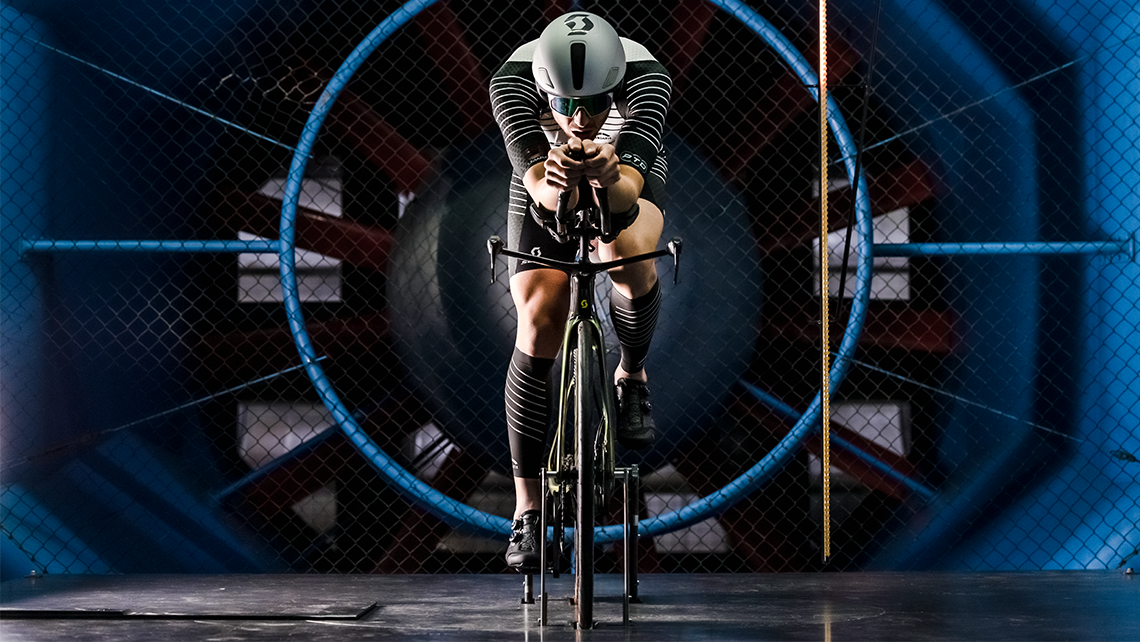
The start of a journey together
June 14, 2020: All athletes have been massively affected by the impact of the global Covid19 pandemic. Not so the young Swedish professional triathlete Rasmus Svennigsson. He apparently remained completely unimpressed by the situation of no official competitions and completed a long-distance triathlon in his home region of Stockholm all by himself. He completed the 226km swim, bike and run in under 8 hours for the first time, wearing a tri-suit recommended by his aerodynamics partner. The Streamliner Bullet. This was the best compliment Skinfit could get from such a world-class athlete, and so the the story of Rasmus Svenningsson and Skinfit began.
The 30-year-old made his breakthrough as a professional triathlete in 2021, winning his age group at Ironman South Africa in 2018, qualifying for the World Championships in Hawaii and returning as the age group world champion (25-29). Shortly after, Rasmus completed his medical studies and from then on pushed his professional sports career. And with success! In his first professional season in 2021, the Swede finished every race on the podium and won Ironman Lake Placid.
Everything was made for him and his great future. But in the spring of 2022, the dream was abruptly interrupted by a serious cycling accident during training that resulted in a compound fracture of the collarbone. As a result, Rasmus went through a rollercoaster year with ups and downs, comebacks and deep frustration. But now he is back and will attack again in 2023!
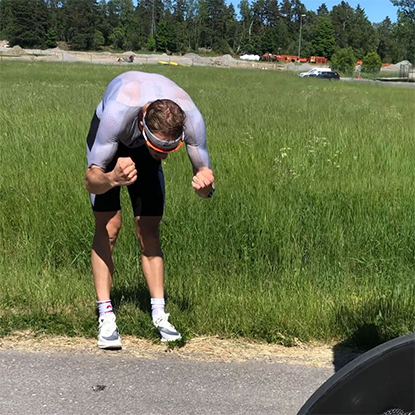
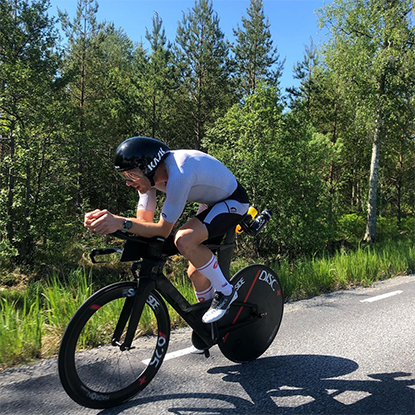
We talked to him after his fourth place at Ironman South Africa and direct qualification for the World Championships in Nice.
Hey Rasmus, congratulations on a strong race and your ticket to the World Championships in Nice. How are you doing?
Rasmus: Thank you very much! Indeed it is a kind of relief that I could get the ticket for Nice right after the horror year 2022 but I am still not one hundred percent fit. Recovery always takes much longer than I think. It's going in the right direction but there are still a lot of training kilometers missing. Of course I always want to be on the podium, but considering where I come from, I can be more than satisfied with fourth place.
What expectations did you have for South Africa, the place where you've already been so successful in 2018?
Rasmus: I just wanted to do everything right again. After last year's training crash, it was more than uncertain for me whether and how quickly I would get back in shape and, above all, competitive. You can train and simulate races a lot and my preparation sessions went really well but it's never the same as in a real race. I was physically and mentally super well prepared for the race in South Africa but you just have to have race experience. And I'm still missing that competition toughness.
You had a very hard time last year but now you are back. How do you deal with disappointments in general? What did you take away from last year's situation?
Rasmus: 2022 was such a super tough year for me. Up until my accident, I was having a great time with so many podiums. I worked so hard for so long to even get to that point. But I also always had this sweet taste of success. I can't deny that I like it when you're then someone that people like to talk about and whose postcasts they listen to, that press articles come out before races and so on. And then all of a sudden it just stops. First my bike accident and the serious injury and then the desperate attempt at my comeback. I put way too much pressure on myself and wanted to get back to where I was as quickly as possible. All I cared about was eating, sleeping and training. It got completely out of control because I sacrificed everything else just to get back. Maybe I should have listened more to the doctors and accepted the really serious injury. This overall situation was very difficult for me to cope with because, after all, I earn my money with my sport. I felt very lonely very quickly. Of course I had my father, who was always by my side, but I still felt alone. It was a completely new situation for both of us and we didn't really know how to deal with it.
So I just kept going and tried to prepare for Ironman Israel at the end of November. But I was physically and mentally very far from my goals. I didn't seem to enjoy the race situation in Israel and I didn't feel any inner excitement at all. I didn't really want to be there at all and when I had the problems with the timing chip right before the start (note: Rasmus lost his timing chip before the race and was disqualified after the swim), it almost felt like a release. I was so incredibly tense. I didn't know that about myself at all. At that moment, I felt like something was absolutely wrong and I really needed to figure out what was going on with me. I didn't recognize myself at all and the alarm bells were ringing.
Back home, I took some time for myself and went to see a sports psychologist to get some ideas on how I could see things a little differently. That wasn't the direct solution but it was a big help for me to this day. Another important factor in hard times for me was the support from my sponsors and Ronnie (note: Ronnie Schildknecht has been looking after Rasmus as manager since 2022) who has always supported me. I never felt like I was losing anything. No one ever pushed me or put me under pressure, so I was able to take my time and focus on myself. Maybe the key to success is that I work more and more with smaller companies where I really feel at home and we also have a kind of personal bond.
You talk about your father and the mental support from a sports psychologist. How important is your environment for you?
Rasmus: Since I fell really low last year, I've been using the care of a sports psychologist and we're making real progress. Before 2022, I didn't have any real problems. Since I became a professional triathlete, things have always been going well. I've delivered in races and even done more than I did in training. There was no need to consider anything like mental support at all. But now after my 2022 experience, it's definitely a good thing to see what's going on in my head.
And of course my family and my sponsors are very important to me. They are equally a great motivation. I want to make them proud with my performance. I live with my father, so he is involved in my everyday life almost every day. But I also feel a lot of pressure from that side, because he is super dedicated, but also has a stressful job and other commitments. He's a big support for me and that's very important, but for a while it was maybe a bit too much. When we went to races, for me it was like going away to perform as well as I could and that's the most important part of my job. But for him, it was also a vacation from his job at home. So sometimes we had different expectations of each other and I felt a little guilty that he was taking his necessary vacation to support me at the races. Now we're trying to find a better balance and we're definitely on the right track to do that. Of course he will be at most of the races, but I will be organizing and managing a bit more on my own. That takes the pressure off me. If I don't do so well in a race and therefore get less or no prize money, it's more about me and not so much about him. To go from my current family support to professional support like a whole team with a manager and so on would probably be very expensive. I know it would be the best solution, but at the moment I don't think I can afford it.
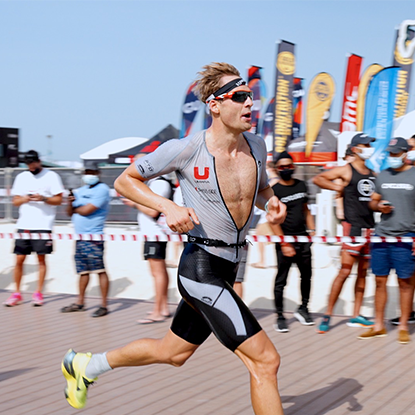
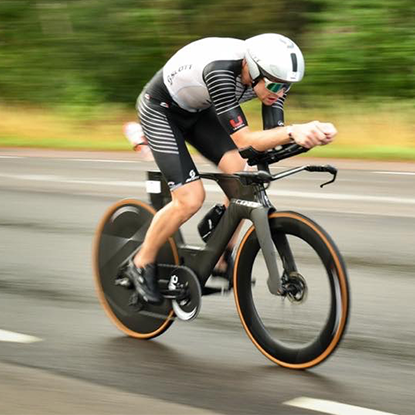
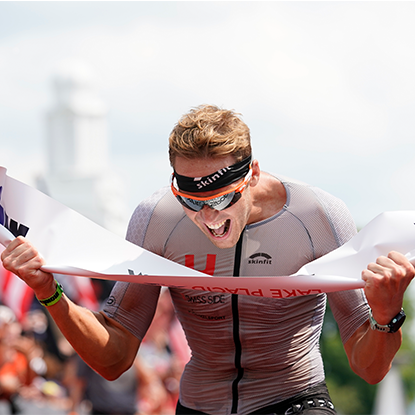
Who do you train with and how exactly?
Rasmus: I have worked with several coaches in the past, such as David Tilbury-Davis (Lionel Sanders' coach), but many different factors led me to end it. The chemistry between a coach and myself was never such that I felt one hundred percent comfortable. Either we had a really good relationship on a personal level but the type of training wasn't perfect for me or we lacked that personal connection. It's a little difficult for me to stubbornly follow a mere trainer philosophy because I really know my body and the type of training I respond best to. Likewise, I am so interested in training science myself. Being able to think freely and be responsible for myself brings so much motivation and joy to my sport. I have the basic knowledge through my studies and I always have to be involved in all decisions. That is a big part of my motivation. To keep that excitement going, I'm not working with a coach at the moment. But of course I've been inspired by my experiences with former coaches like David and I still implement a lot of that. On the other hand, I lack a bit of confidence and it would be really good to have someone on your side who you can trust and who is involved in pretty much everything, but who is not family. It's a balancing act and difficult decision. I think I have a problem trusting myself - but maybe that's a Swedish quirk. The Norwegians, for example, are quite different. Gustav and Kristian (Gustav Iden, IM world champion and Kristian Blummenfelt IM 70.3 Weiltmeister 2023) just say they are the best. But I don't have that demeanor (unfortunately). So maybe I need someone who rather gives advice and corrects the direction now and then. Right now I get confidence from my tests and the bare numbers I do in my training. One big insight I took away from South Africa was that although my values on the bike were good, I was rather passive on the race course. I just did my own thing and didn't follow any race dynamics. That may have been good for this race because I needed a solid performance and result but for the upcoming races I want to be back in it for real and also take some risks on the bike. Most of the time I train alone and to be honest I like it. I'm not that social when I'm in training. I'm pretty focused on my sessions and that's where being alone helps. I live in an area where you can get super indoor and outdoor workouts. That's perfect for me. But every now and then I also do training sessions with my age group colleagues from my triathlon and swimming club. There are certainly advantages and disadvantages to doing most of your training alone, but ultimately you have to do the groundwork. That's the most important thing and without that it's very difficult to get to the top of the world anyway.
What role does material and especially your clothing play for you?
Rasmus: My clothing is super important for me. Both in training, in everyday life and especially in competitions. Being properly regenerated and always wearing functional clothes is super important. I always have to be dry, not too warm and not too cold dressed. I also just have to feel comfortable and look good. I pay a lot of attention to all my gear. If I have the best equipment for me, it gives me confidence for the races and I feel I have the best support and nothing slows me down or hinders me. Especially on the bike, my real fast race suit is unbeatable. I am convinced that the Tri Suit is much more important than, for example, the brand of bike I ride. Of course it is me who has to perform but it helps to be as aerodynamic as possible. And my Tri Suit is one of the deciding factors in that. Also on the run I need the best material that fits great and definitely doesn't generate any extra heat. In that respect, the Streamliner Bullet is incredibly good. Its material is extremely thin and super breathable. It just feels great in the race. I've tried many different materials and couldn't find a tri suit as perfect for racing in the heat as this one. Since 2020 it has always kept me as cool as possible and consistently works really well for me.
You like to go to the wind tunnel a lot for testing. Why? What insights have you gained for yourself so far?
Rasmus: I'm still trying to work on my aerodynamics. I know I have a lot of power in my legs but I still need to be more economical. I would like to take a few more minutes as a buffer onto the run course. For me, it's mostly about testing my material and making sure I've done my best in that regard. Last year, for example, I tested a completely new cockpit for my bike and we found that it was actually much faster. Testing in the wind tunnel is absolutely educational for me and continuously improves me. It helps me find the right balance between a comfortable riding position and one that is as aerodynamic as possible. I first developed this interest in material and things like that as a triathlete. Back then, when I was still active in cross-country skiing, the material didn't interest me at all. But after I stopped having ambitions for the pro ranks and got interested in triathlon, I realized that I had neglected that part too much. Of course I would like to just go and try to be as fast as possible but triathlon has become such a complex sport that small details can make the difference. Likewise, I just enjoy tinkering and trying new things. Luckily my sponsor provides me with the facilities for wind tunnel testing free of charge. That makes it much easier and I experiment more often that way. For us professional athletes, money always plays a big role. As a professional, I don't have it in abundance. It's always a question of how much can I spend on this or that. So I still have to be a bit careful about my testing, but without a bit of risk and investment you can't reach the maximum either, and sometimes small changes can make the difference between winning and losing. In the end, it's about maximum speed and that involves more than just pure performance.



What role does nutrition play for you? Are you rather strict or can you also have cake and chocolate?
Rasmus: For most training sessions, I have a clear plan. In terms of hourly carbohydrate intake in training and competition, I work with my nutrition sponsor. I try out different things and then know exactly how much carbohydrate I can consume. Especially in competition, that's very important. But in my daily diet, I don't count calories. I try to eat as healthy as possible and replenish my stores as quickly as possible after each workout. Since I train a lot and have a very high energy demand, I also have to eat a lot of carbohydrates and really good nutrients. So far I've been lucky and have stayed relatively injury free and also have very few sick days. I'm sure that's mainly because I always watch what I eat and make sure my energy levels are high. Even though I am not the lightest athlete with my size, I am not trying to lose weight and I am very happy with my current condition. Throughout the year I stay pretty stable with my weight. Both sides are important to me: not losing or gaining too many kilos. Maybe I try to lose another 2 to 3 kilos before competitions with mountainous courses like Nice. But it's not so easy to lose weight and automatically become faster. It's more difficult for me to maintain performance at a lower body weight. At home or when I shop for myself, I have my standardized meals but when I am in a hotel, I eat what they have. I do pretty well with unfamiliar food from other countries. At competitions I carry a whole bag of my own sports drinks, gels and bars. I often don't have enough room to take any other food with me.
For some years now, there has been a real coffee cult among triathletes. Are you a coffee connoisseur?
Rasmus: I definitely like coffee but I'm not a coffee expert. At home, I only drink instant coffee. We have this Swedish instant coffee brand that is the only one I really like. It's only with this Swedish instant coffee that I have this feeling of "this is a good coffee." But I've also told myself that if I win a big race, like a national championship with good prize money, I'll buy one of those really expensive espresso machines.
How do you see the developments around the Ironman World Championship? Are you tempted to start in Nice in September?
Rasmus: I would certainly rather go to Kona than Nice, but in the end it's the World Championships and I want to be there. I think Ironman is making a bit of a sad development there. I am sure Nice will be great for us. But I am very critical about the change for the age group athletes. After all, I used to compete in the age group and I remember 2018 very well, when it was a really big deal for me to go to Hawaii. I was there this year and in 2018 for the World Championship slot in South Africa. We were in this to really big conference room with all these people and everybody wanted their slots. There were maybe 2, 3 or 4 athletes of all ages that turned down their slots. And now it was maybe 70 percent that didn't take the slot. Now the spirit is totally lost. For me personally, it will be more positive because it's so much cheaper and just requires less investment. The climate in Nice in September will also suit me much more. But I'm an emotional guy when it comes to all that. Hawaii is already something else. I'm super happy and satisfied with my qualification - but if the World Championships were held in Hawaii this year, I'd be all over it right now. I would be so happy to return to this magical place. With Nice, it feels less special. I'm really looking forward to being part of our World Championships but I'm not crazy excited. Also, the separation into men and women is very hard to handle for the age group athletes and families. I would certainly be more positive if the World Championships were held together for everyone, alternating between Nice and Kona year after year. I see it as a good development that the women get their own race and thus more attention. Ironman is in favor of it, but for most people, for example, in terms of broadcasting, it would be good to watch two races at the same time. It's not necessarily exciting to watch just one race over such a long race duration. Probably the women would get more attention if they were broadcast together with the men or the other way around - it always depends on the point of view. As a pro, it's nice to have your own race first and then watch the women but it's probably not feasible to have two long distance races back-to-back in one weekend. Anyway, it is what it is and I have to deal with it.

What does your race calendar look like for 2023?
Rasmus: Since I have already qualified for the World Championships, I am leaning towards Ironman Hamburg because it is earlier in time than Challenge Roth. So I can do another race between Nice and Hamburg. I plan to get as much race experience as possible in 2023. Also, in Hamburg there is more of a chance for a cooler race and I want to see what time I can run in cooler conditions. When I pick my races, I also always look a bit at the potential prize money. So next it will be Ironman 70.3 Oceanside, maybe Ironman 70.3 Kraichgau, Ironman Hamburg, Ironman Switzerland and then the World Championships in Nice.
We still have one question: What are your big goals for your professional career? And where do you currently see yourself on this path?
Rasmus: Oh, I'm sure I have 10 years left ;)! The most important thing for 2023 is to have fun at the races and to be able to fight for the top places again. It would definitely be great to win another Ironman as well. For the World Championships, a top ten finish should be possible if I'm fit. My long term goal is to really fight for the world title. I.e. to be among the favorites and to have a great chance to win the title. Of course it would be nice to be at the top and become world champion, but if I could be among the best in the world and fight, my career would be perfect even without a world title. So far I've only had one serious season as a professional triathlete. So I am still pretty much at the beginning of my professional career. I think that in 2 to 3 years it will definitely be possible to be among the best athletes in the world. Maybe even next year. Right now I'm thinking from day to day and trying to get better and better. Basically, there are still two things I need to improve: My swimming, which is just not that good, and my little race experience. Once I have more competition toughness and experience, I can be more specific about my goals in training and then I'll be in the racing game. For my swimming I need a few more months of serious training, I just lost a lot of time there last year. I'm already working on that with my swim group and an extra technique coach.
That sounds like very precise ideas and a great future. Thank you Rasmus - we wish you all the best and a successful season!

